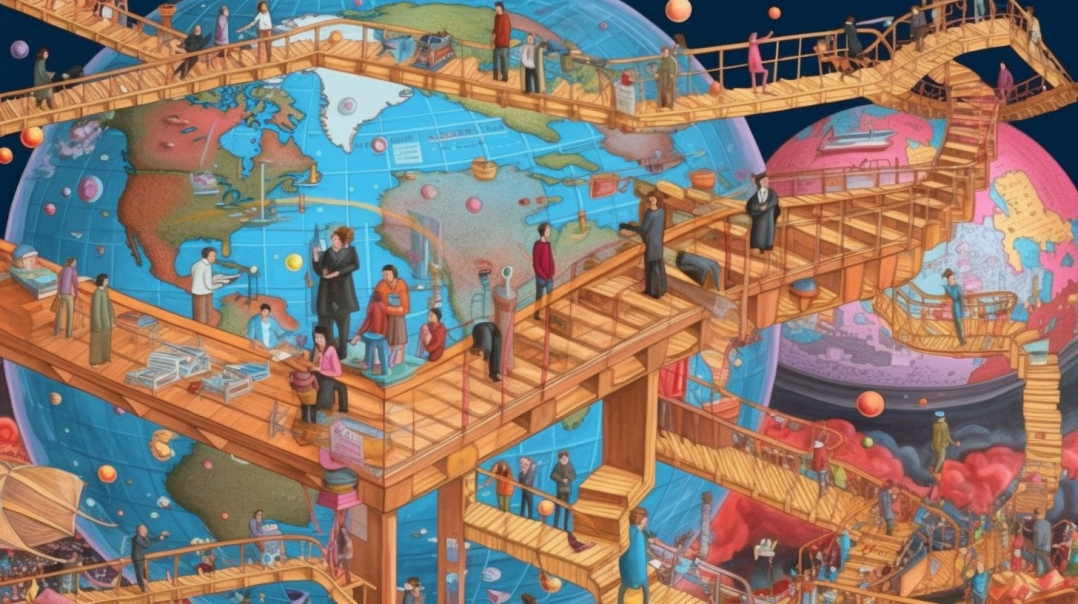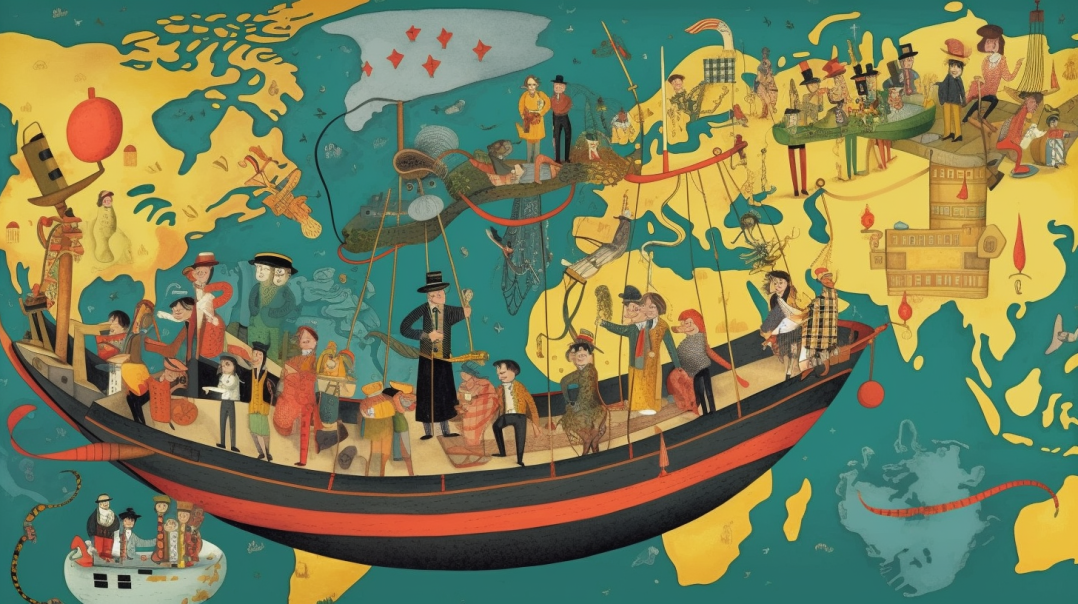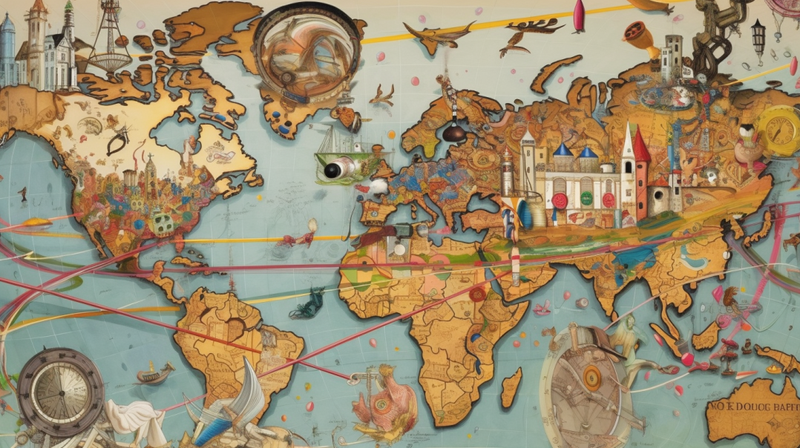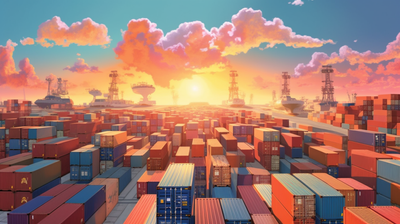The Geopolitical Insights of Peter Zeihan: Navigating the Unraveling of Globalization
In intellectual discourse, a figure emerges, an erudite orator whose relevance is unparalleled. Beta opens up, and with it comes Peter Zeihan's voice, a rational individual whose wisdom I ardently follow. As a geopolitical expert and writer of profound commentary, his works demand attention, for within them lie insights into the intricate web of global affairs. I implore you to acquaint yourself with his literary oeuvre or lend an ear to his thought-provoking podcasts to bask in the knowledge of one of the most profound speakers, his focus unwaveringly fixed upon geopolitical events. His recent literary offering, "The End of the World Is Just the Beginning," delves into the sphere of ongoing geopolitical occurrences, fraught with currents that have subtly accumulated over time.

With utmost anticipation, we extend our warm welcome to Peter, inviting him onto the stage as he graces us with his presence. Greetings exchanged, he settles into the environment, ready to engage in a discourse with a gathering aware of the profound impact of globalization upon their enterprises and livelihoods. It is fitting to delve into Peter's perspective on globalization and its manifold implications.
Globalization emerges as an intriguing anomaly. Historically, the cost of transportation constituted a significant percentage, often ranging from 90% to 99%, of any goods or products. Yet, the tides of fate have shifted, and we now find ourselves dwelling in an epoch where transportation costs amount to less than 1%. Such a transformation did not occur by happenstance; it necessitated profound changes in prevailing conditions.

Indeed, numerous factors sustained the 99% transportation cost paradigm throughout history, primarily driven by security concerns. Contemplate the magnitude of goods we transport in the present day. Imagine the ramifications if a single evil actor, be it a foreign government or a pirate, were to interrupt a single step within a supply chain. Such an occurrence would prove sufficient to cripple the entire system. Such was the norm throughout history. To dismantle this fragile order, we embarked on a journey to eradicate every naval power from the stage, ensuring the absence of any alternative economic model rivalling it. The cataclysmic destruction of World War Two paved the path toward this transformation. At the culmination of this turbulent era, the United States, recognizing the indispensability of an alliance to confront the formidable Red Army at the zenith of its power, resolved that globalization alone would not suffice. They sought companions who would valiantly shield the free world, knowing that such commitment demanded a price. Thus, the globalization model was born, wherein our navy, the sole survivor aside from the British, assumed the responsibility of patrolling the vast global oceans. This unprecedented access allowed all nations to interface with one another and access our market, ultimately becoming the bedrock of the trading system we now recognize.
We have traversed the path before us for seventy-five years, guided by this foundation. However, a confluence of factors has necessitated a shift in this paradigm. Firstly, for the United States, globalization served as a bribe intricately linked to its security apparatus. Yet, the evolution of our understanding of security, stretching across five presidential administrations, has gradually propelled us away from the path of globalization. Even if a hypothetical future president were to vehemently deny this deviation and advocate for the preservation of globalization, the die has already been cast. A singular global navy, the underlying fabric that enabled globalization to flourish, has dissipated into a more fragmented landscape. In the wake of the Cold War, our naval forces underwent recalibration, resulting in an increasingly pronounced emphasis on supercarrier dominance. Within the decade, the number of supercarriers in our possession will reach fourteen—a formidable arsenal, should one aspire to decimate a nation. However, if one's goal is to patrol the global oceans, an armada of approximately 800 destroyers would be required. Alas, the USA possesses a mere seventy. At the present rate of naval expansion, they shall be unable to provide the comprehensive coverage witnessed during the Cold War in the upcoming century. Consequently, the security paradigm facilitating multi-modal shipping and multi-step manufacturing supply chains has already waned, awaiting only a pirate's misstep to herald the system's unravelling.

But why would a nation or a pirate, as our distinguished speaker posits, disrupt the foundation underpinning global connectivity? Each actor perceives the matter through the lens of their interests. Consider the three nations most reliant on maritime transport for their exportation endeavours—China, Russia, and Iran. Each possesses a vested interest in fostering disruptions within their respective domains. China seeks to expand its reach, extending its influence beyond the horizon. Russia and Iran harbour ambitions of obtaining more favourable energy prices. However, they fail to recognize the consequences in the realm beyond their immediate purview. Though potentially advantageous within their spheres, their actions lead to the erosion of their more extensive systems. Yet, it is not solely these nations who are complicit. Even the United States, having severed its identification with global economic growth as a core component of its security paradigm since Herbert Walker Bush's tenure, bears witness to the gradual retreat from the tenets of globalization.
Daniel's Take:
- Globalization, a historically unique concept, has seen transportation costs diminish exponentially, revolutionizing trade dynamics.
- The security-driven transformation of globalization after World War Two created the conditions for economic alliances and trade expansion.
- The United States, once a staunch advocate of globalization, has steadily shifted its stance as security paradigms evolve.
- The diminishing capacity of naval forces and the rise of supercarriers jeopardize the comprehensive global coverage essential for sustained globalization.
- Nations and pirates may disrupt global connectivity to further their localized interests, failing to consider the broader consequences.
- The erosion of the global economic growth-security paradigm signifies an irreversible departure from globalization.
Cameron's Take:
I think I discovered Peter Zeihan around the same time everyone else did, and his overt and sweeping statements immediately intrigued me. But as I dug deeper, watched more, and read more; I discovered that many assumptions were the foundation of his commentary, many of which are false. For example, globalization is an area where he is making a variety of presumptions about the global environment that have little basis in reality.
The basis of this thesis on the death of globalization mainly concerns that the U.S. is no longer committed to securing shipping lanes with hard assets (ships), which will change the expense and calculus of global shipping. This is an excellent idea but has no basis other than the changing roster of naval ships (which he will haul out). If this were true, the insurance companies who ensure these large ships would charge more to ensure a voyage, and some companies might even pull out of long journeys. This hasn't happened. In fact, in May of 2023, Iran tried to seize an oil tanker, and all it took to get the ship released was a sternly worded letter from Washington, D.C.
Zeihan also assumes that the U.S. is the only power capable of securing shipping lanes that support globalization. That assumption is not far off of plumb, but the reality is that other nations like France and the U.K., who sport smaller and capable navies of their own, also have an interest in keeping global shipping lanes open.
Before the pandemic began, globalization seemed to be on a march forward without end. In graduate school in 2011, it was orthodoxy that globalization was here to stay. The upset pandemic globalization and wealthy countries realized their industrial bases had been so eroded that they could not manufacture needed equipment domestically. Ships trapped offshore with no one to unload them meant lost profits, spoiled goods, and shortages throughout the supply chain system. Developed nations have copped wise to the problem, and companies are reshoring and "friend-shoring" production to balance shorter supply chains and labour costs.
Another aspect that has broken up globalization that doesn't get enough press from Zeihan is the West's issues with China and the War in Ukraine. After the pandemic, China's zero-Covid policy wreaked havoc on supply chains. The Chinese origin of the virus and their lack of warning (coupled with active suppression) of the coming crisis has soured relations with the West, particularly with the United States. In 2022, I did a podcast called "Opium, Opiates, Pandemics and Wars," where I talk about how pandemics often cause violent conflict, and it is a testament to modern institutions that we have avoided violent conflict over the pandemic (at least so far). This is far more important than naval hardware or Zeihan's ideas that globalization is winding down. The reality is that global trade has existed in various forms since the 15th century, and while the days of 3000-mile supply chains might be over, globalization and a globalized economy are not going anywhere anytime soon.
Speculating on the Good (καλός) inherent in this writing:
We find cause for reflection. While the erosion of globalization may engender challenges and uncertainties, it also provides an opportunity for introspection and reevaluation. By shedding the shackles of an increasingly fragile system, nations may be compelled to reassess their priorities, fortifying their strengths and resilience. Moreover, the waning influence of a singular global navy necessitates collaboration and multilateral engagement to ensure the sustenance of interconnectedness in a world beset by evolving geopolitical landscapes. Embracing this new era, we may discover unforeseen avenues of prosperity and security grounded in a redefined understanding of our interconnected global community.






